#open rpg creative license
Link
Paizo has made an official statement about the OGL 1.1:
We believe, as we always have, that open gaming makes games better, improves profitability for all involved, and enriches the community of gamers who participate in this amazing hobby. And so we invite gamers from around the world to join us as we begin the next great chapter of open gaming with the release of a new open, perpetual, and irrevocable Open RPG Creative License (ORC).
The new Open RPG Creative License will be built system agnostic for independent game publishers under the legal guidance of Azora Law, an intellectual property law firm that represents Paizo and several other game publishers. Paizo will pay for this legal work. We invite game publishers worldwide to join us in support of this system-agnostic license that allows all games to provide their own unique open rules reference documents that open up their individual game systems to the world. To join the effort and provide feedback on the drafts of this license, please sign up by using this form.
In addition to Paizo, Kobold Press, Chaosium, Green Ronin, Legendary Games, Rogue Genius Games, and a growing list of publishers have already agreed to participate in the Open RPG Creative License, and in the coming days we hope and expect to add substantially to this group.
This is massive news! Paizo has assured that their usage of the OGL for PF2 was optional, and meant to help third party content creators more than being something they relied on for their own system.
Now, they will be creating the ORC, which will be a successor to the OGL which many third party content creators will be able to benefit from. They will be taking measures to ensure the ORC won’t belong to any company, so this doesn’t repeat itself, and covering the legal costs of getting it coming to fruition. Which is massive news in these times.
A lot of third party content creators and smaller TTRPGs have already expressed their support to this new ORC already.
Amidst these news, I’d like to remind what has WOTC been doing currently instead:
DnD Beyond suddenly saw their option to unsuscribe disappear, which they blamed on servers. (Trust me: I have coded pages, and it’s not something that just casually can disappear because of server saturation)
A recurrent stream from DnD Beyond was cancelled. They claimed it is unrelated to the OGL news
WOTC has once again delayed a proper official statement about the OGL, and has been holding off from confirming it.
People have been ending their subscription for DnDBeyond as a form of protest, as it’s the metric WOTC is currently using to measure the impact of the new OGL.
Overall, employees have reported that the situation at WOTC right now is a massive mess, as the new OGL was not supposed to be leaked (contrary to what people had theorized).
Keep pushing WOTC to revoke the OGL, of course. If all these changes have been happening, it’s thanks to the reunited effort from the community and creators to fight against it.
(As always, reblogs for awareness are appreciated!)
#wotc#ogl#orc#paizo#wizards of the coast#open game license#open rpg creative license#pathfinder#pathfinder 2e#one dnd#open dnd#onednd#opendnd#long post
894 notes
·
View notes
Text

Here's a link to the announcement on their website.
It looks like Paizo is making their big move with the fears and rumors around the OGL situation. They've noted before that they're confident that Pathfinder 2nd Edition didn't have to be published under the OGL, and that they only did so to make it easier for people making third party material. Rather than having to switch to a new license and setup, they could continue just using the OGL.
Now, with even the rumor that WotC would roll back the OGL, they're going to be funding the creation of their own Open RPG Creative (ORC) License. Their goal for this is to be truly open, system agnostic, perpetual, and (most importantly given the current fears) irrevocable. Additionally, they don't intend to own this ORC License, instead trusting it to a third party of some kind, preferably a nonprofit with a strong dedication to open source licenses. This would put it outside of their control to meddle with it in the future, or for anyone who purchases Paizo (like say Hasbro) from being able to do so.
They're opening up a mailing list for anyone to see their drafts and provide feedback, and they already have a large list of publishers who are signing on for it, including Kobold Press, Chaosium, Green Ronin, and many others.
If this works as they're saying, it would be a huge deal for small publishers. A license that any system or game could be put under, out of control of any large corporation, that would allow the best parts of the OGL to be spread to many other companies and independent creators. I think regardless of how things shake out with the OGL, this is going to have a big impact on the TTRPG industry as a whole. The OGL as written was good for a lot of third party groups, but it did all funnel back to giving D&D a much larger market dominance, which this one shouldn't repeat in exactly the same way. Rather than most of the works for the OGL supporting D&D in particular, this ORC may have the chance to raise many games.
354 notes
·
View notes
Text
Entry to the BRP Design Challenge is free.
As part of submission, entrants will need to provide:
A pitch for their game (both in long and short form).
A production budget for their game.
An outline on how the winnings from the BRP Design Challenge will help bring their game to life
A competitor market analysis of their game, showcasing where it fits in the market as a product.
How the BRP rules have been used in their game.
What makes their use of the BRP system, their setting, and/or the gameplay experience unique.
All entrants retain ownership of their work in its entirety. Chaosium does not require the signing over of rights of any kind in order to enter the BRP Design Challenge.
Winners and shortlisted entries will also retain ownership and—regardless of what winnings may be received as part of this competition—may still publish their games royalty-free under the ORC license.
34 notes
·
View notes
Text
they really said fuck it, it's Orcs vs. Wizards out here
#ttrpg#dunegons and dragons#open gaming license#open rpg creative license#ogl#orc#WOTC#paizo#hasbro#pathfinder#starfinder
22 notes
·
View notes
Text
PAIZO LAUNCHES THEIR OWN OPEN LICENSE!
The new ORC license is supported by a huge number of tabletop game devs and will not be controlled or owned by Paizo.
#dungeons and dragons#wizards of the coast#hasbro#d&d beyond#d&d#wotc#paizo#pathfinder#starfinder#green ronin#chaosium#kobold press#opendnd#ogl#open game license#Open RPG Creative License#ORC
13 notes
·
View notes
Text
Under a Hostile Sun
Under a Hostile Sun is a new tabletop RPG where your enemy isn’t the monsters – it’s the very environment itself.
The galaxy recently had a great upheaval. Now many, seeking to escape corrupt local governors and war-ravished worlds, are desperately taking to space exploration. It’s a hope for a better life. But at a cost. The planets explored will include environments not easily inhabitable…

View On WordPress
#alchemy#aliens#astronaut#challenging#creativity#indie#Indie RPG#itch.io#magic#martians#OGL#Open Game License#Open RPG Creative License#ORC#Photoshop#potions#role playing game#role playing games#roleplaying game#rpg#rules-lite#science fiction#space exploration#Tabletop RPGs#ttRPG#Unsplash
2 notes
·
View notes
Text
Atlas Games announces its support for Paizo's ORC License system
Atlas Games announces its support for Paizo's ORC License system #ttrpg
With an unknown future concerning Wizard of the Coasts’ Open Gaming License, numerous other companies are stepping up with their own gaming license. Paizo recently released its ORC licensing system.
Atlas Games has announced its plans and where its company stands in the shifting and unknown future. Read their full statement below:
Written by John Nephew, owner Atlas Games
You’ve probably heard…
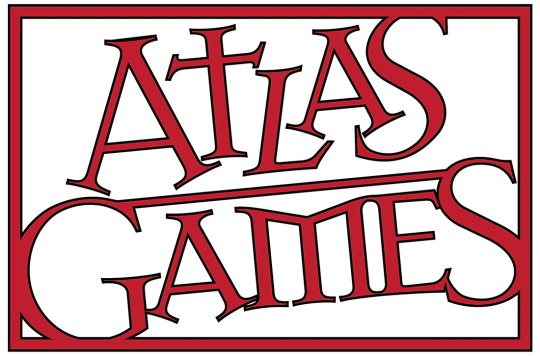
View On WordPress
2 notes
·
View notes
Text
PAIZO ANNOUNCES SYSTEM-NEUTRAL OPEN RPG LICENSE
https://paizo.com/community/blog/v5748dyo6si7v
Paizo does not believe that the OGL 1.0a can be “deauthorized,” ever. While we are prepared to argue that point in a court of law if need be, we don’t want to have to do that, and we know that many of our fellow publishers are not in a position to do so.
We have no interest whatsoever in Wizards’ new OGL. Instead, we have a plan that we believe will irrevocably and unquestionably keep alive the spirit of the Open Game License.
As Paizo has evolved, the parts of the OGL that we ourselves value have changed. When we needed to quickly bring out Pathfinder First Edition to continue publishing our popular monthly adventures back in 2008, using Wizards’ language was important and expeditious. But in our non-RPG products, including our Pathfinder Tales novels, the Pathfinder Adventure Card Game, and others, we shifted our focus away from D&D tropes to lean harder into ideas from our own writers. By the time we went to work on Pathfinder Second Edition, Wizards of the Coast’s Open Game Content was significantly less important to us, and so our designers and developers wrote the new edition without using Wizards’ copyrighted expressions of any game mechanics. While we still published it under the OGL, the reason was no longer to allow Paizo to use Wizards’ expressions, but to allow other companies to use our expressions.
We believe, as we always have, that open gaming makes games better, improves profitability for all involved, and enriches the community of gamers who participate in this amazing hobby. And so we invite gamers from around the world to join us as we begin the next great chapter of open gaming with the release of a new open, perpetual, and irrevocable Open RPG Creative License (ORC).
#paizo#dnd#wizards of the coast#rpgs#Open RPG Creative License#tbh I figured they were doing something like this and therefore wasn't *too* worried*#Hasbro can go suck eggs
6 notes
·
View notes
Link

#epilepsy cw#tw: epileptic content#gif warning#pathfinder#dungeons and dragons#star wars#truth#open rpg creative license#ogl#paizo
4 notes
·
View notes
Text
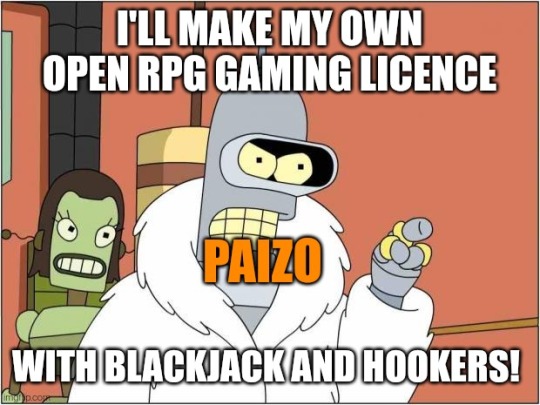
0 notes
Text
Open Game Notion Database
I've made some updates to the Notion database of open-license game texts. Since Hasbro/WotC has taken OGL reauthorization out of its immediate crosshairs (without making the OGL 1.0a irrevocable), I've added the legacy OGL 1.0a entries back. I've also differentiated between CC-BY and CC-BY-SA, and broken out "other" into Publisher-Controlled licenses (such as those for Mork Borg, Cypher, and BRP) from small and midsize publishers, and indie games that have some sort of brief, informal, or alternative license or "unlicense." Note that much like the OGL, publisher-controlled licenses may or may not be revocable.
I've not added any licenses or texts that aren't released yet, so no references to ORC, the CC-BY version of Basic Fantasy, or Matt Finch's S&W license. Yet. I also won't add licenses that are specific to individual sites, such as DTRPG's Community Content programs.
I've talked about my feelings about WotC's attempt to deauthorize the OGL 1.0a, but I don't want to leave the OGL out if it's not in immediate danger. However, I'll only add new or currently unlisted OGL texts (or compatibility licenses that depend on them) at my own discretion.
#open license#creative commons#ogl#indie roleplay#indie ttrpg#ttrpgs#tabletop game design#tabletop roleplaying#tabletop rpgs
6 notes
·
View notes
Photo
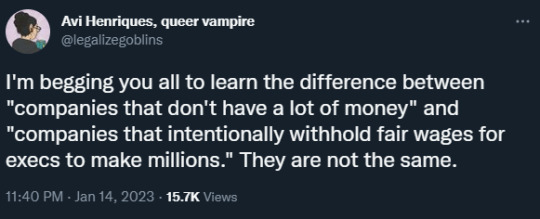
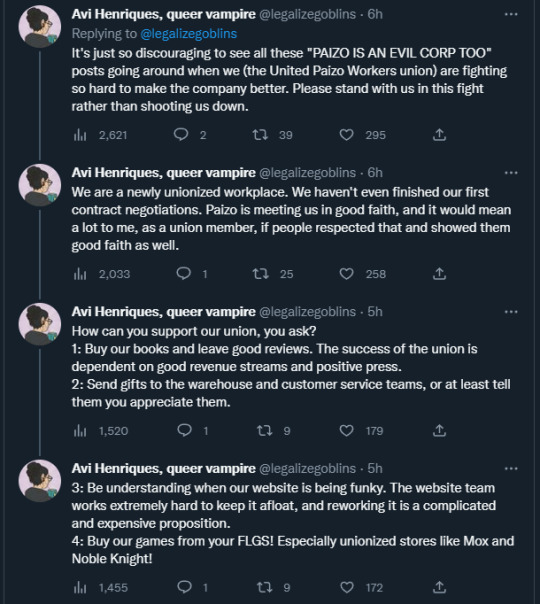
There’s been a bit of talk concerning Paizo’s wages towards artists. As an artist: I will say they are low, although the people who reported on them have shared very old wages and current wages may differ.
I am however choosing to share the words of the workers at Paizo themselves about what is their current situation, and how to actually help them in case you are concerned. It’s important to note Paizo is not even 1% the size of Wizards of The Coast, which was the first brand to reach 1$ billion for Hasbro.
Paizo’s yearly revenue is 12 Million, for reference. 12 million is about what CR managed to collect in a single Kickstarter for their animated series. It’s not that much when you take into mind they currently have 125~ employees (vs WOTC’s 1000 employees).
Again: As an artist, the wages they are currently playing are low. But they have an union (being still the first union in the TTRPG sphere), and they have been using it to fight for better conditions. Employees themselves are publicly asking for people to stand back and let them negotiate it themselves. They are confident these negotiations are headed in a good direction. I will hold Paizo accountable if, given an increase in their revenue, they do not raise their wages, but I’d rather believe what people currently working for them ask for.
(Also, please do not harass Paizo’s employees about this. Do not harass individual employees over ANY of this, no matter the company.)
And of course, it’s important to ask why and who is currently trying to defend WOTC, and what is WOTC currently doing to their employees. Here’s what DnD Shorts managed to get from the employees themselves at WOTC:
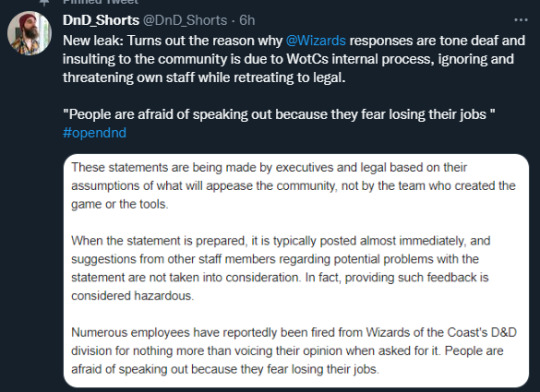
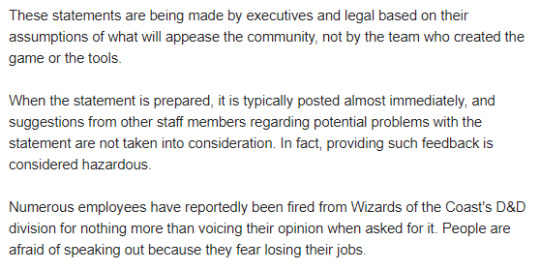
#paizo#wotc#wizards of the coast#ogl#open game license#open gaming license#orc#open rpg creative license
311 notes
·
View notes
Photo
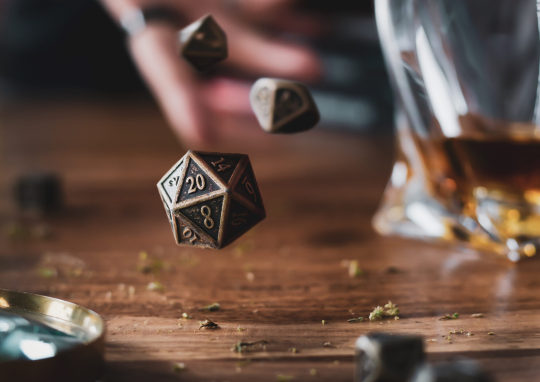
DungeonCraft on how to defeat the Open Gaming License 2.0
The firestorms continue over the leaked Open Gaming License 2.0 (OGL 2.0) from Hasbro/Wizards of the Coast. Given the extent of the backlash over the leaked draft (first reported by i09), Wizards was forced to release a laughably disingenuous statement (as a Friday news dump, no less) that inflamed the gaming community even further. — Read the rest
https://boingboing.net/2023/01/16/dungeoncraft-on-how-to-defeat-the-open-gaming-license-2-0.html
#Post#Dungeons & Dragons#Open Gaming License#Open RPG Creative#tabletop gaming#TTRPGs#Gareth Branwyn#Boing Boing
0 notes
Text
Good riddance to the Open Gaming License
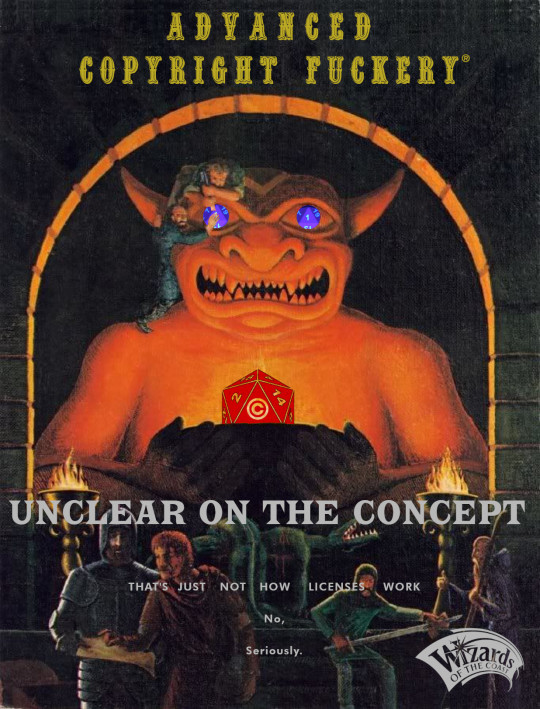
Last week, Gizmodo’s Linda Codega caught a fantastic scoop — a leaked report of Hasbro’s plan to revoke the decades-old Open Gaming License, which subsidiary Wizards Of the Coast promulgated as an allegedly open sandbox for people seeking to extend, remix or improve Dungeons and Dragons:
https://gizmodo.com/dnd-wizards-of-the-coast-ogl-1-1-open-gaming-license-1849950634
The report set off a shitstorm among D&D fans and the broader TTRPG community — not just because it was evidence of yet more enshittification of D&D by a faceless corporate monopolist, but because Hasbro was seemingly poised to take back the commons that RPG players and designers had built over decades, having taken WOTC and the OGL at their word.
Gamers were right to be worried. Giant companies love to rugpull their fans, tempting them into a commons with lofty promises of a system that we will all have a stake in, using the fans for unpaid creative labor, then enclosing the fans’ work and selling it back to them. It’s a tale as old as CDDB and Disgracenote:
https://en.wikipedia.org/wiki/CDDB#History
(Disclosure: I am a long-serving volunteer board-member for MetaBrainz, which maintains MusicBrainz, a free, open, community-managed and transparent alternative to Gracenote, explicitly designed to resist the kind of commons-stealing enclosure that led to the CDDB debacle.)
https://musicbrainz.org/
Free/open licenses were invented specifically to prevent this kind of fuckery. First there was the GPL and its successor software licenses, then Creative Commons and its own successors. One important factor in these licenses: they contain the word “irrevocable.” That means that if you build on licensed content, you don’t have to worry about having the license yanked out from under you later. It’s rugproof.
Now, the OGL does not contain the word “irrevocable.” Rather, the OGL is “perpetual.” To a layperson, these two terms may seem interchangeable, but this is one of those fine lawerly distinctions that trip up normies all the time. In lawyerspeak, a “perpetual” license is one whose revocation doesn’t come automatically after a certain time (unlike, say, a one-year car-lease, which automatically terminates at the end of the year). Unless a license is “irrevocable,” the licensor can terminate it whenever they want to.
This is exactly the kind of thing that trips up people who roll their own licenses, and people who trust those licenses. The OGL predates the Creative Commons licenses, but it neatly illustrates the problem with letting corporate lawyers — rather than public-interest nonprofits — unleash “open” licenses on an unsuspecting, legally unsophisticated audience.
The perpetual/irrevocable switcheroo is the least of the problems with the OGL. As Rob Bodine— an actual lawyer, as well as a dice lawyer — wrote back in 2019, the OGL is a grossly defective instrument that is significantly worse than useless.
https://gsllcblog.com/2019/08/26/part3ogl/
The issue lies with what the OGL actually licenses. Decades of copyright maximalism has convinced millions of people that anything you can imagine is “intellectual property,” and that this is indistinguishable from real property, which means that no one can use it without your permission.
The copyrightpilling of the world sets people up for all kinds of scams, because copyright just doesn’t work like that. This wholly erroneous view of copyright grooms normies to be suckers for every sharp grifter who comes along promising that everything imaginable is property-in-waiting (remember SpiceDAO?):
https://onezero.medium.com/crypto-copyright-bdf24f48bf99
Copyright is a lot more complex than “anything you can imagine is your property and that means no one else can use it.” For starters, copyright draws a fundamental distinction between ideas and expression. Copyright does not apply to ideas — the idea, say, of elves and dwarves and such running around a dungeon, killing monsters. That is emphatically not copyrightable.
Copyright also doesn’t cover abstract systems or methods — like, say, a game whose dice-tables follow well-established mathematical formulae to create a “balanced” system for combat and adventuring. Anyone can make one of these, including by copying, improving or modifying an existing one that someone else made. That’s what “uncopyrightable” means.
Finally, there are the exceptions and limitations to copyright — things that you are allowed to do with copyrighted work, without first seeking permission from the creator or copyright’s proprietor. The best-known exception is US law is fair use, a complex doctrine that is often incorrectly characterized as turning on “four factors” that determine whether a use is fair or not.
In reality, the four factors are a starting point that courts are allowed and encouraged to consider when determining the fairness of a use, but some of the most consequential fair use cases in Supreme Court history flunk one, several, or even all of the four factors (for example, the Betamax decision that legalized VCRs in 1984, which fails all four).
Beyond fair use, there are other exceptions and limitations, like the di minimis exemption that allows for incidental uses of tiny fragments of copyrighted work without permission, even if those uses are not fair use. Copyright, in other words, is “fact-intensive,” and there are many ways you can legally use a copyrighted work without a license.
Which brings me back to the OGL, and what, specifically, it licenses. The OGL is a license that only grants you permission to use the things that WOTC can’t copyright — “the game mechanic [including] the methods, procedures, processes and routines.” In other words, the OGL gives you permission to use things you don’t need permission to use.
But maybe the OGL grants you permission to use more things, beyond those things you’re allowed to use anyway? Nope. The OGL specifically exempts:
Product and product line names, logos and identifying marks including trade dress; artifacts; creatures characters; stories, storylines, plots, thematic elements, dialogue, incidents, language, artwork, symbols, designs, depictions, likenesses, formats, poses, concepts, themes and graphic, photographic and other visual or audio representations; names and descriptions of characters, spells, enchantments, personalities, teams, personas, likenesses and special abilities; places, locations, environments, creatures, equipment, magical or supernatural abilities or effects, logos, symbols, or graphic designs; and any other trademark or registered trademark…
Now, there are places where the uncopyrightable parts of D&D mingle with the copyrightable parts, and there’s a legal term for this: merger. Merger came up for gamers in 2018, when the provocateur Robert Hovden got the US Copyright Office to certify copyright in a Magic: The Gathering deck:
https://pluralistic.net/2021/08/14/angels-and-demons/#owning-culture
If you want to learn more about merger, you need to study up on Kregos and Eckes, which are beautifully explained in the “Open Intellectual Property Casebook,” a free resource created by Jennifer Jenkins and James Boyle:
https://web.law.duke.edu/cspd/openip/#q01
Jenkins and Boyle explicitly created their open casebook as an answer to another act of enclosure: a greedy textbook publisher cornered the market on IP textbook and charged every law student — and everyone curious about the law — $200 to learn about merger and other doctrines.
As EFF Senior Staff Attorney Kit Walsh writes in her must-read analysis of the OGL, this means “the only benefit that OGL offers, legally, is that you can copy verbatim some descriptions of some elements that otherwise might arguably rise to the level of copyrightability.”
https://www.eff.org/deeplinks/2023/01/beware-gifts-dragons-how-dds-open-gaming-license-may-have-become-trap-creators
But like I said, it’s not just that the OGL fails to give you rights — it actually takes away rights you already have to D&D. That’s because — as Walsh points out — fair use and the other copyright limitations and exceptions give you rights to use D&D content, but the OGL is a contract whereby you surrender those rights, promising only to use D&D stuff according to WOTC’s explicit wishes.
“For example, absent this agreement, you have a legal right to create a work using noncopyrightable elements of D&D or making fair use of copyrightable elements and to say that that work is compatible with Dungeons and Dragons. In many contexts you also have the right to use the logo to name the game (something called “nominative fair use” in trademark law). You can certainly use some of the language, concepts, themes, descriptions, and so forth. Accepting this license almost certainly means signing away rights to use these elements. Like Sauron’s rings of power, the gift of the OGL came with strings attached.”
And here’s where it starts to get interesting. Since the OGL launched in 2000, a huge proportion of game designers have agreed to its terms, tricked into signing away their rights. If Hasbro does go through with canceling the OGL, it will release those game designers from the shitty, deceptive OGL.
According to the leaks, the new OGL is even worse than the original versions — but you don’t have to take those terms! Notwithstanding the fact that the OGL says that “using…Open Game Content” means that you accede to the license terms, that is just not how contracts work.
Walsh: “Contracts require an offer, acceptance, and some kind of value in exchange, called ‘consideration.’ If you sell a game, you are inviting the reader to play it, full stop. Any additional obligations require more than a rote assertion.”
“For someone who wants to make a game that is similar mechanically to Dungeons and Dragons, and even announce that the game is compatible with Dungeons and Dragons, it has always been more advantageous as a matter of law to ignore the OGL.”
Walsh finishes her analysis by pointing to some good licenses, like the GPL and Creative Commons, “written to serve the interests of creative communities, rather than a corporation.” Many open communities — like the programmers who created GNU/Linux, or the music fans who created Musicbrainz, were formed after outrageous acts of enclosure by greedy corporations.
If you’re a game designer who was pissed off because the OGL was getting ganked — and if you’re even more pissed off now that you’ve discovered that the OGL was a piece of shit all along — there’s a lesson there. The OGL tricked a generation of designers into thinking they were building on a commons. They weren’t — but they could.
This is a great moment to start — or contribute to — real open gaming content, licensed under standard, universal licenses like Creative Commons. Rolling your own license has always been a bad idea, comparable to rolling your own encryption in the annals of ways-to-fuck-up-your-own-life-and-the-lives-of-many-others. There is an opportunity here — Hasbro unintentionally proved that gamers want to collaborate on shared gaming systems.
That’s the true lesson here: if you want a commons, you’re not alone. You’ve got company, like Kit Walsh herself, who happens to be a brilliant game-designer who won a Nebula Award for her game “Thirsty Sword Lesbians”:
https://evilhat.com/product/thirsty-sword-lesbians/
[Image ID: A remixed version of David Trampier's 'Eye of Moloch,' the cover of the first edition of the AD&D Player's Handbook. It has been altered so the title reads 'Advanced Copyright Fuckery. Unclear on the Concept. That's Just Not How Licenses Work. No, Seriously.' The eyes of the idol have been replaced by D20s displaying a critical fail '1.' Its chest bears another D20 whose showing face is a copyright symbol.]
#pluralistic#copyfraud#wizards of the coast#wotc#dungeons and dragons#d&d#ogl#open gaming license#eff#fair use#kit walsh#consideration#licenses
8K notes
·
View notes
Text
Let's talk about Gale's sex scenes
I love the astral sex scene and it means so much to me, and I have some problems with the way I've seen it talked about.
I should start by saying this post is not intended to critique anybody's personal preferences. The license to do Whatever The Fuck in an rpg is sacrosanct and there are no wrong choices. But I’ve also seen people imply that the astral scene is not “real” sex, or that Gale romancers “deserved more.” I hope I do not have to explain why that's kinda fucked.
Additionally, I think it is a saddening misread to call the astral scene “performative” in contrast to the bed scene (which gets correspondingly framed as “showing Gale that you want the real him.”) But doing a grandiose magical gesture IS the real him!
I know I'm not alone in viewing Gale as autistic; for me the astral sex scene is a big contributor to that. For one thing, it resonates with the concept of having unusual sensory wants. For another, it reads to me as Gale opening up and showing his passion for magic to the PC in a way he’s never been able to with another mortal before. What neurodivergent person has not had someone view their passion as too weird or too over the top? Have you ever been at a level of enthusiasm that wraps back around into seeming “performative” to others? Ever wanted to show a loved one something that matters to you, but worried they’d never understand—or, worse, they’d actively cringe?
In the astral sex scene, Gale shows the PC how much he loves the Weave (which is not the same as loving Mystra), and the PC does not cringe.
If all the glowing merging translucent bodies, the nebulae, the multiplying limbs, the spinning, the trippiness, the celestial music—if all these trappings made you, the player, cringe: there is nothing wrong with that. But I do think it is a misread to say that the bed version constitutes “helping him heal from his trauma.”
Maybe I have a hair-trigger for anything that implies “becoming more sexually normative = character growth.” Or “vanilla sex = a more intimate connection.” But they are just such tiresome concepts.
I understand that some of the dialogue in the game also suggests that idea, but all that dialogue is coming from the PC. What Gale says is that having bodily sex is “a small gesture toward your comfort.” This has been widely glossed over, imo.
Ultimately the two versions of this scene fulfill two different narrative functions: the bed version is to show the player that Gale will set these wants aside for you should you ask him to. But the astral version is there to show the player who HE is and what HE wants. And I think it is sad to write off this beautiful, lovingly crafted, unique and creative approach to a sex scene as merely something “performative” that he only does because Mystra made him think he had to.
“Stay with me now. There are endless worlds out there. Countless ways to declare love. Infinite ways to express it. Too much for one night... but we shall try.” I've admittedly got a ways to go in the game, but so far this is my single favorite line of dialogue. I genuinely don't understand how people can hear this line, the way it’s acted, and think it's just for show. He knows he's about to get weird but he longingly, vulnerably asks you to stay there in his weirdness with him.
Many writers, when they are writing something kinda out there, have doubts of the form Who is this even for? If the astral scene just isn’t for you I don't have beef with that. But the people who saw the astral sex scene and went "Oh, my god, now THIS is FOR ME"—are perhaps people who only very rarely get to watch a sex scene and have that reaction.
I'm glad Baldur's Gate brought something this beautiful to this particular table and I think it deserves consideration as a serious element of Gale’s characterization.
#gale dekarios#gale of waterdeep#baldur's gate 3#bg3#bg3 meta#the promised essay#i made a very rabid shitposty untagged version of this earlier#and i think it upset a few people#this version is a better representation of my reflections#verbose bitch romances the party wizard news at 11#wizardsexual#long post
740 notes
·
View notes
Text
For those late to the party who want to know what the hell is going on with #OpenDnD, #StoptheSub, #DnDBegone etc, and why everyone is cancelling DnDBeyond subscriptions, I tried to do a crash course as succinctly as possible. OpenDnD.Games is a great resource for more in-depth details, and if you wish to do so, you can cancel your DnDBeyond subscription through this direct link (as there have been many reporting trouble in locating where to do so).
Edit: Tweaked the very first detail below, as someone reminded me it was not a wholly accurate statement as I had initially written it. Apologies to everyone who already reblogged the first version of this :')
Hasbro acquired Wizards of the Coast (WotC) some time ago, but recently they got new leadership who said in an interview that they see D&D as "under-monetized". Hasbro is on the decline with finances, and WotC is its biggest cash cow. Why milk that cash cow through producing more content when you can instead revoke a legally irrevocable license that makes it impossible for 3rd party content creators to exist?
America loves a good monopoly. The old license that permitted the community to grow to what it is today was OGL1.0a, and without it, D&D would not be what it is right now, nor even close. They tried to shift to OGL1.1, a new license that is, in a word, PREDATORY. Horrific, nasty shit.
OGL1.1 was quietly sent to large creators to sign. It then got leaked. The community erupted. The backlash was loud and unanimous. WotC was radio silent for like two weeks. They finally gave a single-sentence "we'll explain soon" tweet on DnDBeyond's account. Then more silence.
A WotC employee reached out to large creators to blow the whistle on WotC. The source was verified, and they shared that WotC sees the community as an obstacle between them and their money, all they care about is bottom line, and they're delaying in hopes we forget and move on.
And also that they are mainly looking at DnDBeyond subscription cancelations to gauge the financial impact; they don't care about our sentiments, only our money. So everyone erupted into signal boosting for others to unsubscribe as the single and best way to make ourselves heard. Cue the mass unsubscribing.
Today (January 13th 2023), a shitty PR piece was posted on DnDBeyond full of blatant lies and, in my opinion, barely-contained saltiness. Right before that, though, OGL2.0 leaks came out; the tweaks they'd begrudgingly made following the backlash. 2.0 is basically just as bad as 1.1; they just spoke of it as being more changed than it was.
In other words, they keep bold-faced lying to a community of rules-lawyers who recreationally read fine print :)
Meanwhile, Paizo (creators of Pathfinder) has come to the rescue, vowing to release a truly open license that will allow everyone to continue pursuing the livelihoods they're passionate about; this is the Open RPG Creative License, or "ORC".
Canceling subscriptions immediately sends a potent message, even if you may have to resubscribe later for functionality in your games. You'll still have the remainder of your billing cycle to enjoy paid perks.
Everything's a little on fire, but I think we'll be okay ♥️
OGL1.0a was never meant to be revocable, as loudly stated in the past couple days by the very people who authored it. It is very likely that WotC is actually just bluffing and bullying, and is actually powerless to revoke it--something many lawyers more knowledgeable than myself seem to be suggesting. In which case, it is my greatest hope in all of this that 3rd party creators are able to continue doing what they love, with no further interruptions.
Remember: the majority of WotC and DnDBeyond employees feel the exact same way we do, but they don't have a choice. Hasbro is the enemy here. Be kind to each other, and know where blame should and should not be placed. If you want to stay up to speed, the account of @.DnD_Shorts seems to be a very active and informed voice, largely responsible for sharing the first leak. If Twitter makes you want to puke, I completely understand; DnD_Shorts also has a YouTube channel with frequent updates on the situation posted in video format.
It's cathartic to me to try to signal boost this stuff, and provide summaries that might help others stay informed. It helps me feel like I'm somehow able to affect these nasty things that are otherwise just inflicted onto lil guys in the community like myself.
However, this has been beyond exhausting and stressful. I'm going to start untangling myself and stepping back from posting about this issue so I can hopefully restore some of my own sanity.
It's been really crazy--in a good way--to see the power this community has when rallied together under a common threat. It makes me proud to be in that community.
At the end of the day, all TTRPGs are really just exercises in creativity and fun. The golden rule has always been and should always be that there is no right or wrong way to play, other than what suits you and those you play with. Likewise, no one should ever feel guilty or judged by others for playing one system over another. It's okay to like D&D5e despite all this. No matter how much they've tried, Wizards of the Coast cannot claim jurisdiction over the invaluable memories you've made, and what has become a creative outlet for countless people. Myself included.
Boycotting is a great way to be heard, since they only care about money. But continuing to use the content you have to play D&D5e is your prerogative, and hurts no one. Furthermore, it's also okay if you can't cancel your DnDBeyond subscription because you rely on it too heavily for your games. That doesn't make you a traitor. That doesn't estrange you from the community. DnDBeyond, at its core, is a great tool that is popular for a reason; it's the new leadership that is forcing it to become something it wasn't meant to be. One day, I hope to be able to resubscribe in good conscious, and I hope that day is soon.
To reiterate, if anyone's even read down this far... be kind to one another. Keep in mind that big enemies win when the party is divided. You can love or hate anything you want in the TTRPG sphere, but how you feel about it does not invalidate someone else feeling the opposite.
Be kind. Be patient. Be empathetic. We're already coming out on top.
#if youre considering taking an opposing stance to the community just to be contrarian or highIQ just. breathe.#the devil doesnt need as many advocates as he has honestly.#opendnd#stopthesub#dndbegone#dndbeyond#ogl#wotc#wizards of the coast#hasbro#dnd#dnd5e#ttrpg#paizo#pathfinder#onednd#dungeons and dragons#rpg#orc#open rpg license#openrpg#critical role#cr#daarka gekkers
957 notes
·
View notes